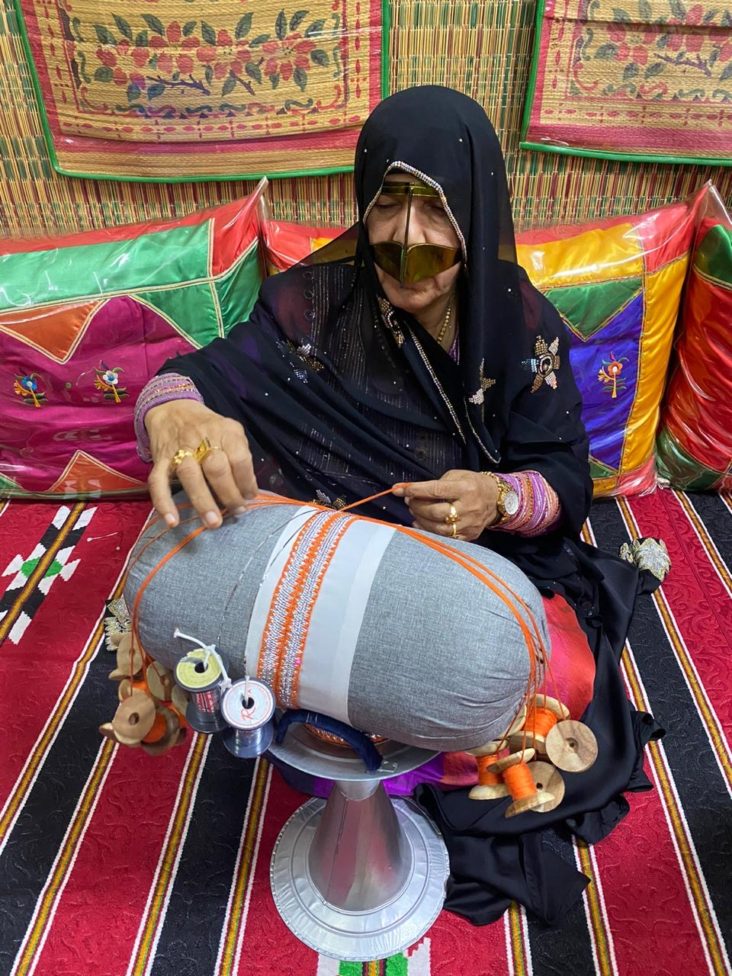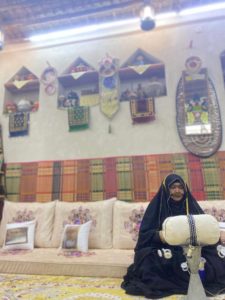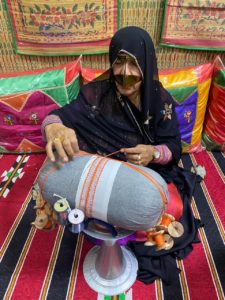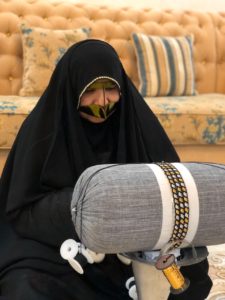Artisans & Designers Are Embracing A New Creative Routine To Boost Productivity And Pursue New Skills

In a quiet corner of her home set in the picturesque city of Dibba Al-Hisn, around 130kilometres from central Sharjah, 31-year-old Maryam Mohammed Ahmed Aldhahericoncentrates on her work, weaving spools of brightly coloured cotton threads, interspersing them with synthetic metallic threads in gleaming gold and silver. Her dexterous fingers tug at the colourful bobbins, going back and forth in rhythmic motion, creating elaborate patterns.
Triangular and zigzag motifs of brightly hued colours soon emerge as the Talli, a traditional Emirati craft of handwoven braids, begins to cast its enduring spell on the complex intertwined design she is working on.
The world may be in the grip of a pandemic, but for Maryam and her fellow artisans at Irthi’sBidwaSocial Development Centre, the global public health crisis has not dampened the fervour of creativity as they practice this timeless craft tradition.
Embracing a new creative routine
Maryam is one among the 66women artisans who were weaving both local and locally-inspired international crafts daily at the BidwaCentre before physical distancing policies were introduced with the onset of the coronavirus disease. An additional 11artisans had previously worked at home.
While the atmosphere at the BidwaCentre resembled a large familial gathering where artisans shared stories and laughter, Maryam has now embraced the solitude and new creative routine that working from home has instilled.
Allocating a specific place to work and working at her choice of time has led to greater productivity, she admits. “I work in the morning when things are calm as it helps me focus better. This has increased the pace of work and I pour my energies into creating as much Tallias possible.”
Her fellow artisans who recently graduated from the IrthiSkills Exchange Programme focusing on Pakistani embroidery could not agree more. Shaikha Ali Alnaqbi, for instance, works in her quiet space daily from 8am to 1pm, taking an occasional break to allow herself to recharge.
Another programme graduate, Alia Ali Aldhanhaniretreats into her special work corner to make the most of quiet afternoons. “Our pace of work may have changed but not the quality of craftsmanship which is ingrained in our hearts. The beautiful designs I create helps restore my energy,” she adds.
Bushra Mohamed Abdelrahman, who also works on Pakistani embroidery, isolates herself in a separate room to focus on her work, “to recreate the atmosphere of the Bidwa Centre, I communicate regularly with my colleagues and supervisors and this makes me feel that we are all still together.”
The homegrown Emirati craft is once again returning home
With the launch of the Bidwa Social Development Programme in 2016, Irthi, an affiliate of NAMA Women Advancement Establishment (NAMA), had sought the revival and modernisation of traditional crafts by providing vocational training and upskilling programmes to empower women economically, professionally, and socially, and to find new markets for their skills.
Talli, an indigenous craft of the UAE that celebrates Emirati culture, and which originated in Emirati homes centuries ago, is now returning to the home, albeit temporarily, points out Farah Nasri, Assistant Manager – Curation & Design at Irthi.
The decision to temporarily close the Bidwa Centre in mid-March came on the instructions of Her Highness Sheikha Jawaher bint Mohammed Al Qasimi, wife of the Ruler of Sharjah and Chairperson of NAMA, who made the swift decision to enable all employees – including the artisans to work from home using the Centre’s fully-sanitised tools and craft equipment.
Meticulously designed operating practices steering ‘at home’ workshops
Remote working has heralded a major shift in the way the artisans at the BidwaCentre operate today. According to Sharifa Al Dhuhoori, Manager of Bidwa Centre, “Onceour designers agree upon the designs to be produced, the details are documented by email. The Centre’s supervisors then prepare the required quantities of material in specific sizes and select the thread colours which are then individually sealed in sterilised bags for each artisan.”
“These sterilised kits contain the weaving materials along with specific written instructions explaining the craft techniques to be used,” explains Nasri. “We have a WhatsApp group to communicate with our fellow artisans and they sometimes upload their working videos onto the group to guide each other. Production coordination and management also continues virtually via WhatsApp. Once the artisan completes the work, the Bidwa Production Team organises for the items to be packed and dropped off to the centre.”
With the cancellation or postponement of several global exhibitions and fairs in which Irthi was a key participant, the Council is now planning to engage the international design community with Emirati culture by launching its projects online, she adds. “This will allow Irthi to take forward its mission of preserving, championing and elevating traditional Emirati craft practices, in the context of modern global design.”
#StayHome time is ripe for creativity
As an emirate that has recently joined 65 other cities around the world as a new member of UNESCO’s Creative City list, it is hardly surprising that the artisans at Irthi’sBidwa Centre embody this spirit of creativity not just in their roles as incubators of traditional Emirati crafts but also in championing innovative practices of pursuing new skills and expanding the boundaries of their artistic talents.
While Bidwa artisan Alia Ali Aldhanhani is using her spare time to stir up her passion in cooking and encouraging her daughters also in the art of traditional and modern cuisines, her colleague Bushra Abdelrahman has been tuning in to YouTube to learn new stitches and techniques of choosing and creating well-balanced colour combinations and is on the cusp of creating a new design incorporating all the stitches she has learned. Meanwhile Shaikha Ali Alnaqbi immerses herself in videos on the art of embroidery. “I also practice drawing and find time to take care of my garden,” she adds.
Farah Nasri, on the other hand, believes that “home is the only place we have total control over now.It is therefore the right time to invest in curating the spaces around us to make them more soothing and uplifting. Small tweaks such as adding in some greenery, sculptures, a designer chair or a scented candle can enliven the spaces where we work and live.”
“The coronavirus pandemic has heightened our awareness of all the things that we took for granted – our freedom, comfort, security and safety,” says Bidwa Centre’s manager Al Dhuhoori. “The times are unprecedented; but Irthi has affirmed its commitment to the safety of its artisans. They are our pride; and we are doing all we can to keep their spirits high.”




